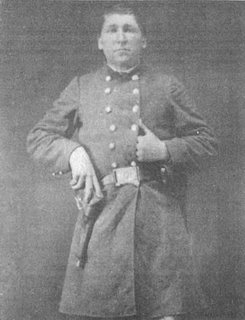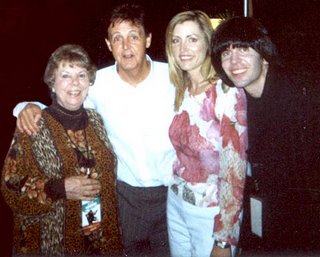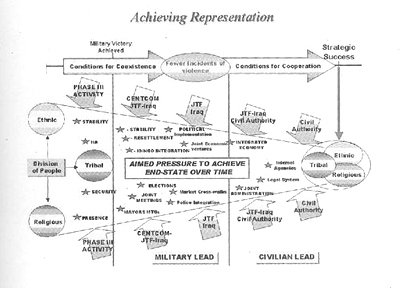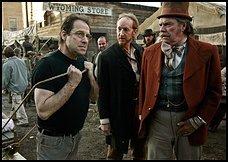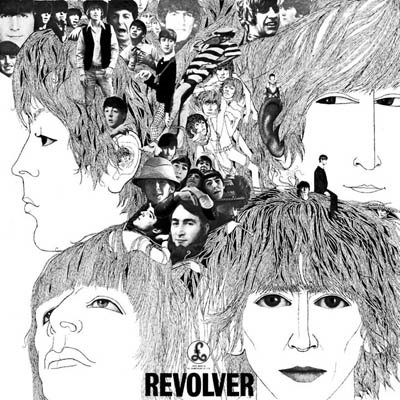
Caution forbids me to say where I work, but I can reveal it's a rather large company (although about to be quite a bit smaller, if the CEO is to be believed). It's large enough, and media-savvy enough, that one is greeted each morning in the lobby by a big plasma-screen monitor that scrolls through announcements of upcoming events, product releases, visiting lecturers, social events and the like. Earlier this week I noted that an employee Christian affinity-group was using this company resource to announce an outreach program of some sort; one imagines a fairly dreary gathering, with servings of dechocolated cocoa with sugar-free marshmallows, featuring teary testimonials to the power of Christ's love to make straight the way to writing PowerPoint business cases. Implicit in quite a lot of the testimony, I imagine, would be a characteristic quiet self-congratulation at belonging to a persecuted minority.
Tant pis. My outrage is close to nil. My policy in the matter is to take a page from these worthies' playbook and hate the religion and not the religious. If they find their lives enriched by pixie-dust and pretzel logic, more power to -- no. That's not the expression I want. If they find their lives enriched, far be it from me to disabuse them.
But I'm not above a little horseplay.
Some while ago, I was in some disreputable mens' room somewhere, and on the wall over the urinal some fuckwit had inscribed an inverted five-pointed star and the legend (spelling preserved): "Hail Satin!" The notion of this dullard devil-worshiper unable to spell the name of his own Fallen Angel amused me for as long as it took to squeeze one out, and then I forgot about it.
But the memory returned this morning as I was mulling over an idea that had occurred to me. As the Kompany Khristians are given free license to use a private communication system for their own purposes, surely the Corporation can be prevailed upon to give equal access to, say, the Mithraists, or the Zoroastrians? Or, it came to me, the Goat-Fucking Blood-Worshipers? What would prevent me from enlisting a few of my kookier friends (and we do exist) to form an affinity group called The Golden Order of the Hermetical Goat Skull in Service of Satan and demand equal time on the company bulletin board? Not because any of us has any particular erotic attraction toward the hollow-horned ruminants or to the Dark Lord (we're just good friends, really) but for the sheer, pigheaded contrariness of it?
Then I remembered "Hail Satin!" This, I realized -- this -- would be the touch that would turn a mere contrarian gesture into a beautiful, complex, meaty, Surrealist put-on worthy of our forebears.
I can imagine the flummoxed look on the face of the HR weasel as he reads the Manifesto of the Sanctified Sodality of the Satin-Worshipers, adorned with our completely nonsensical mystical symbols: "I-I think you've misspelled --"
"Misspelled what, sir?"
"You worship Satan?"
"Oh-HO! The old libel! Persecution, sir! This is a plain, blatant, baldfaced lie, perpetrated by those who would keep us in perpetual servitude! Shame, sir! Shame!"
"But it says here you're Satan-worshippers --"
"Sir, we worship satin! The fabric formed using filament fibers such as silk, nylon, or polyester! Its high luster due to the high number of "floats" on the fabric! Its "missed" interlacings, where the warp yarn lays on top of the weft yarn, or vice versa, tending to make the fabric look glossier as well as give it a smoother hand in most cases! Oh, how we revere the Granite weave and the Check weave, used commonly in apparel goods such as eveningwear and fine clothing, as well as linens such as bedsheets, in some industrial usages, and athletic gear such as shorts and baseball jackets! How superior we find it to the twill weave and the plain weave, the two other basic types of weaving by which the majority of woven products are formed! Hail Satin!"
OK, so we get past the HR weasels by agreeing to tone the name down to the Satin Appreciation Society and losing the inverted pentacles and goat-horns. Some eyebrows are raised as our announcements go up on the bulletin boards, rumors begin to fly among the spelling-challenged that something weird is going on. The Christians submit grievances, alleging a hostile work environment. We reply that we're not hostile so much as really, really passive-aggressive.
More contrarian Satinists join. The movement grows, acquires first a cult, then an aboveground following. News reports appear on satin-worshipping, ascribing all sorts of skulduggery -- ritual murders, sex-orgies, kidnapping of Gentile (we'll call 'em Denimite) babies -- to our nascent movement. Throughout it all, we insist the whole thing is an enormous misunderstanding, that we, People of the Cloth, only wish to be left alone to worship the thread-count of our choice in our own way. We are a persecuted minority! we insist, oppressed by people who can't spell! We say this with a quiet inner smile.
Then we issue a loud, obstreperous demand, perhaps under the letterhead of the American Enterprise Institute for Public Polyester Research, for a vengeful crusade against the Muslin countries -- our slogan: On to Damask, us!
(Somebody please hit me on the head. Right here, behind the ear. Use that bat over there. Thank you.)





